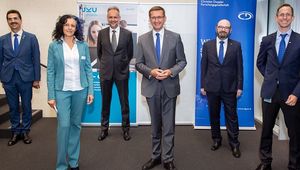Ranging from smartphones to navigation satellites, high-frequency signals are becoming increasingly important and continue to be an integral part of our everyday lives.

The ever-evolving technology behind these HF signals is, however, sophisticated and many companies find it challenging. A Christian Doppler Laboratory at the Johannes Kepler University Linz is now working with Infineon Technologies Austria AG and Joby Austria Ltd. to explore just how to address these challenges.
Funded by the Austrian Federal Ministry of Labour & Economy (BMAW), Christian Doppler Laboratories not only conduct base-knowledge, application-oriented research to the highest standards, they bring outstanding scientists and innovative companies together. Awarded with € 5.2 million in funding, the Christian Doppler Laboratory "Distributed Microwave and Terahertz Systems for Sensors and Data Links" (MWTH) will operate through to 2030.
The Austrian Federal Ministry of Labour & Economy supports pioneering technological research
Under the leadership of Assoc. Univ. Prof. Reinhard Feger (Institute of Communications Engineering and Radio Frequency Systems, JKU), over the next few years researchers will investigate methods to optimize RF system performance and energy efficiency.
Martin Kocher, Minister of Labour and Economic Affairs, remarked: "CD laboratories are an ideal funding model, particularly when addressing the broad range of potential applications and the many unanswered questions regarding scientific foundations. Outstanding base-knowledge research generates a new understanding and level of expertise that company partners can then apply toward developing new processes and products. When it comes to high-frequency technology, the possibilities include new industrial and medical sensors, increasingly faster data connections, as well as autonomous driving and autonomous piloting and aviation."
High-frequency systems enjoy a wide range of applications; smartphone data transmission is based on HF systems, as well as radar sensors used in autonomous vehicles, and high-speed connections at data centers. Prof. Reinhard Feger remarked: "High-frequency systems capable of operating in the terahertz range not only facilitate particularly small components (which are a key feature of modern electronics), they also, for example, increase bandwidth and improve data connections. In addition, lower frequencies are often already full, meaning new services have to switch to using higher frequencies."
High Demand for Research
The downside to higher frequency ranges is that signal processing can be more susceptible to interference, something that is not as important at low frequencies. The interfaces and interaction between individual components can also be difficult and susceptible to errors.
Prof. Feger added: “This is where the CD lab comes in. We intend to thoroughly explore the challenges associated with HF systems and, for example, identify new ways to integrate these frequencies within semiconductor circuits."
Univ. Prof. Alberta Bonanni, JKU Vice-Rector for Research and International Affairs, is delighted about the CD Laboratory and remarked: "CD Laboratories embody our vision to continue pursuing base-knowledge, application-oriented research. This is where science and business work together to address the challenges of today and pool their expertise. I would like to thank everyone involved for making this vitally important laboratory possible."
Partnering with Commerce and Industry
The project will be carried out with Infineon Technologies Austria AG and Joby Austria GmbH, companies that operate in the field of autonomous piloting and aviation.
Manfred Ruhmer, Infineon Technologies Austria AG, Head of the Development Center Linz: "The CD Lab concept is an ideal opportunity to work with a highly motivated team at the JKU Linz and focus on strategically pivotal technologies related to autonomous vehicles. We can continue strengthening Infineon's innovative position in Linz and also introduce young gifted scholars to this sector by means of PhD dissertations. I particularly appreciate the lab's holistic approach, pushing radar technology to its technological limits by venturing into the terahertz range. We are also working on systemic approaches to signal processing and modeling dynamic radar networks. We expect this type of groundbreaking, base-knowledge research to provide us with additional approaches to chip technology and tackle future challenges, such as mobility."
Andreas Haderer, Managing Director of Joby Austria, also has high hopes for the CD laboratory: "In order to guarantee reliable operations, autonomous aviation and piloting require accurate and reliable sensor systems. When it comes to communications, navigation, and detecting non-cooperative flying objects in the airspace, high-frequency systems are indispensable. Distributed radio frequency networks not only improve accuracy, they also enhance the system’s overall reliability. We look forward to working with the CD Lab team to explore and test innovative sensor networks designed to support enhanced navigation and detection. Associate Professor Reinhard Feger and his team’s outstanding expertise will undoubtedly drive advances toward implementing innovative solutions forward."
Christian Doppler Laboratories conduct collaborative high quality, base-knowledge and application-oriented research involving outstanding scientists and innovative companies. The Christian Doppler Research Association is internationally recognized as a best-practice example to encourage and support collaborative research. CD laboratories are jointly funded by the public sector and the participating companies. The Austrian Federal Ministry of Labour & Economy (BMAW) is most important public funding agency.
 Go to JKU Homepage
Go to JKU Homepage











